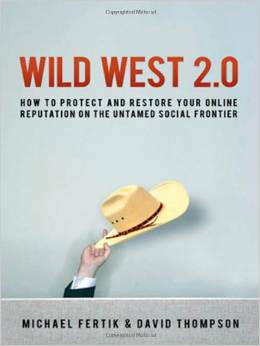Protecting Your Brand’s Image Online
These days, your online Internet reputation is your reputation. Of course, having no reputation is usually better than a bad one, but don’t wait for someone else to establish a good one for you. It’s time for every business and business person to proactively create a positive presence before someone else puts you in a defensive mode that is hard to win.
The first step in the process is to claim your online identity. This is simple in concept, but requires real effort and can be time-consuming and even expensive if someone gets there before you and tries to sell you the rights to your preferred business or personal domain name. See my previous article, Get the Right Domain Name for your Startup.
Michael Fertik and David Thompson bring this issue and many others together in their book “Wild West 2.0.” After you claim your identity with placeholder domain names, accounts in social networks, and common blogging platforms, your next challenge is to create enough positive content as a “Google wall” to keep negative info out of the top Google search results.
Positive content, such as information and pictures on your accomplishments, achievements, and friends, paints you in a good light. Neutral content, including your membership in business associations, and company affiliations, can at best balance false negative information, or at least make the negatives harder to find.
Here are some of the easiest methods we both recommend for creating positive and neutral content:
- Blogging. There are several major free blogging platforms you can use to claim your identity, including WordPress, Blogger, and LiveJournal. If you add new content periodically, it is likely to become a secure and important part of your online resume, and it will come out at the top of any Google searches on your identity.
- Twittering. An even easier way of getting your positive messages to the top of Google rankings is “micro-blogging” through Twitter. This is especially useful in providing links to other positive and neutral content.
- Profile sites. There are several free and paid services such as LinkedIn that allow users to create a short personal profile and to link to other relevant sites. Simply engaging in forum discussions and exchanging comments establishes positive content.
- Other user-created content sites. Sites like Instagram and YouTube allow users to create and share photos and videos and create short profiles. You can use these sites to your advantage by uploading relevant and positive content and prominently including your name in the subject or description.
- Professional directories. Many professions offer free online directories of members or similar sites for professional networking. These sites are often highly ranked in search engine results because they are heavily linked. If there is a directory relevant to your business or profession, use it.
If you have already been a victim of online reputation damage (accidentally or maliciously), proactively reach out to friends and co-workers to explain the problem. They can assist you by linking to positive and neutral content about you, thus displacing or minimizing the negative content.
For your startup, one study found that reputation damage is a bigger risk to most companies than a natural disaster or even terrorism. Remember that during the startup phase where your company is not yet a brand, you are the company, so your reputation and that of your company are tightly linked.
The Internet has been a powerful and disruptive technology. The good news is that you can use it to your advantage. But you can’t ignore it and pretend there is no danger. Just like in prior generations with the Wild West, people who put up a good offense to protect themselves were the ones who survived and prospered. Take heed, and take action.

